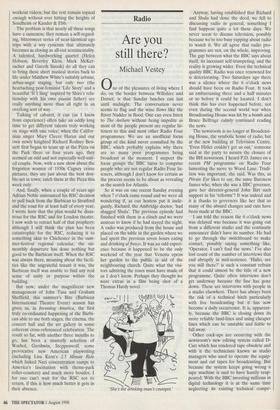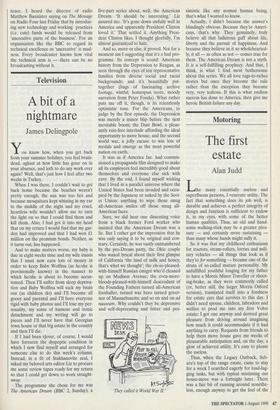Radio
Are you still there?
Michael Vestey
0 ne of the pleasures of living where I do, on the border between Wiltshire and Dorset, is that Sunday lunches can last until midnight. The conversation never seems to flag and the wine flows like the River Nadder in flood. One can even listen to The Archers without being impolite as most of the people present are regular lis- teners to this and most other Radio Four programmes. We are an unofficial focus group of the kind never consulted by the BBC, which probably explains why there are so many poor programmes being broadcast at the moment. I suspect the focus groups the BBC turns to comprise people who are not regular Radio Four lis- teners, although I don't know for certain as the process seems to be about as revealing as the search for Atlantis.
So it was on one recent Sunday evening when 7 o'clock came round and we were all wondering if, as our hostess put it inele- gantly, Richard, the Ambridge doctor, 'had shagged Shula'. The previous episode had finished with them in a clinch and we were anxious to know if he had stayed the night. A radio was producea from the house and placed on the table in the garden where we had spent the previous seven hours eating and drinking alfresco. It was an odd experi- ence because it happened to be the only weekend of the year that Venetia opens her garden to the public in aid of the neighbouring church. Quite what the visi- tors admiring the roses must have made of us I don't know. Perhaps they thought we were extras in a film being shot of a Thomas Hardy novel.
'She's the drinking man's crumpet.' Anyway, having established that Richard and Shula had done the deed, we fell to discussing radio in general, something I find happens quite a lot these days. We never seem to discuss television, possibly because we're too busy yapping about radio to watch it. We all agree that radio pro- grammes are not, on the whole, improving. The gap between what the BBC says about itself, its incessant self-trumpeting, and the reality is growing wider. Even the technical quality BBC Radio was once renowned for is deteriorating. Two Saturdays ago there was a silence where the 6 o'clock news should have been on Radio Four. It took an embarrassing three and a half minutes or so before it could be located. I don't think this has ever happened before, not even during the second world war when Broadcasting House was hit by a bomb and Bruce Belfrage calmly continued reading the news.
The newsroom is no longer at Broadcast- ing House, the symbolic home of radio, but at the new building at Television Centre. 'Even Hitler couldn't get us out,' someone said at the party to mourn the closure of the BH newsroom. I heard P.D. James on a recent PM programme on Radio Four lamenting the move to Wood Lane. Tradi- tion was important, she said. Was this, as Private Eye likes to say, the same Baroness James who, when she was a BBC governor, gave her director-general John Birt such support in his 'reforms'? It was indeed and it is thanks to governors like her that so many of the absurd changes and cuts have been made at the BBC.
I am told the reason the 6 o'clock news was delayed was because it was going out from a different studio and the continuity announcer didn't have its number. He had to go through the switchboard to make contact, possibly saying something like, 'Operator, I can't find the news.' I've also lost count of the number of interviews that end abruptly in mid-sentence. 'Hallo, are you still there?' is such a constant refrain that it could almost be the title of a new programme. Quite often interviews don't get underway because the line has gone down. These are interviews with people in a studio elsewhere. There has always been the risk of a technical hitch particularly with live broadcasting but it has now become a daily occurrence. It is, apparent- ly, because the BBC is closing down its more reliable land-lines and using cheaper lines which can be unstable and liable to fall away.
Other cock-ups are occurring with the newsroom's new editing system called D- Cart which has rendered tape obsolete and with it the technicians known as studio managers who used to operate the equip- ment and cut tapes for broadcasting. But because the system keeps going wrong a tape machine is said to have hastily reap- peared. With the BBC investing millions in digital technology it is at the same time neglecting its existing technical compe- tence. I heard the director of radio Matthew Bannister saying on The Message on Radio Four last Friday that by introduc- ing new technology and working practices (i.e. cuts) funds would be released from 'uncreative parts of the business'. For an organisation like the BBC to regard its technical excellence as 'uncreative' is mad- ness. Every broadcaster knows how vital the technical arm is — there can be no broadcasting without it.



























































 Previous page
Previous page